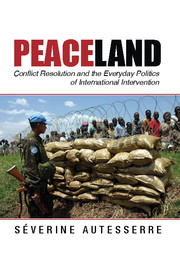Part II - Constructing and Maintaining Boundaries
Published online by Cambridge University Press: 05 July 2014
Summary
The most enlightening Christmas party I ever attended occurred during my fieldwork in an unstable city in eastern Congo. The organizer, a civilian member of the peacekeeping mission, had gathered twenty of her closest friends on site: several military and civilian peacekeepers, a few officials from other United Nations agencies, several staff members of non-governmental organizations, and a diplomat. All in all, the guests were a perfect sample of the people I was studying. Permeating the gathering was a spirit that one of the participants captured: “Here we are all part of a club; we are all here to help Congo.” The second part of my book is about this “club.”
Noticing who was absent from the Christmas party was just as illuminating as studying the guests. Although the attendees came from all kinds of national, professional, racial, organizational, and religious backgrounds, they shared one characteristic: They were all expatriate interveners. No business expatriates had been invited, nor had any Congolese people, though they and their country were the subject of our conversations for most of the day. This particular marriage of diversity and exclusivity is common in Peaceland, and it engenders a specific pattern of interactions between members of the interveners’ club and nonmembers. Accordingly, Part II of the book examines these relationships. I focus principally on how interveners interact (or do not interact) with the local populations and authorities who are their intended beneficiaries. I also study how these local people react to the efforts that some expatriates make to integrate locally.
- Type
- Chapter
- Information
- PeacelandConflict Resolution and the Everyday Politics of International Intervention, pp. 159 - 160Publisher: Cambridge University PressPrint publication year: 2014



